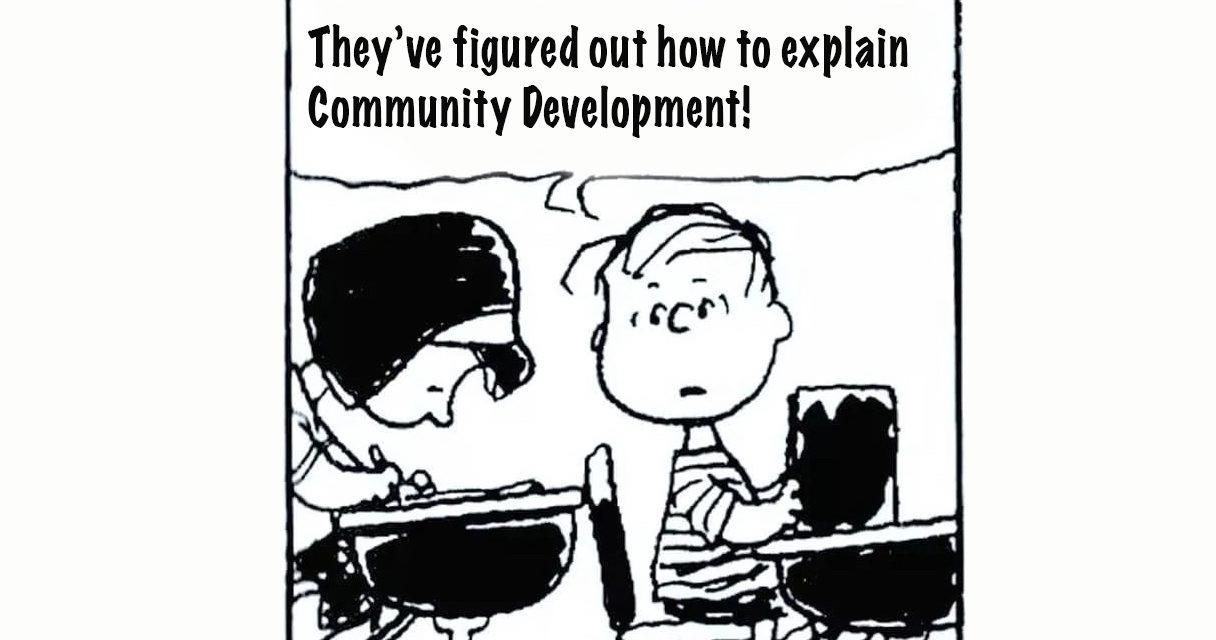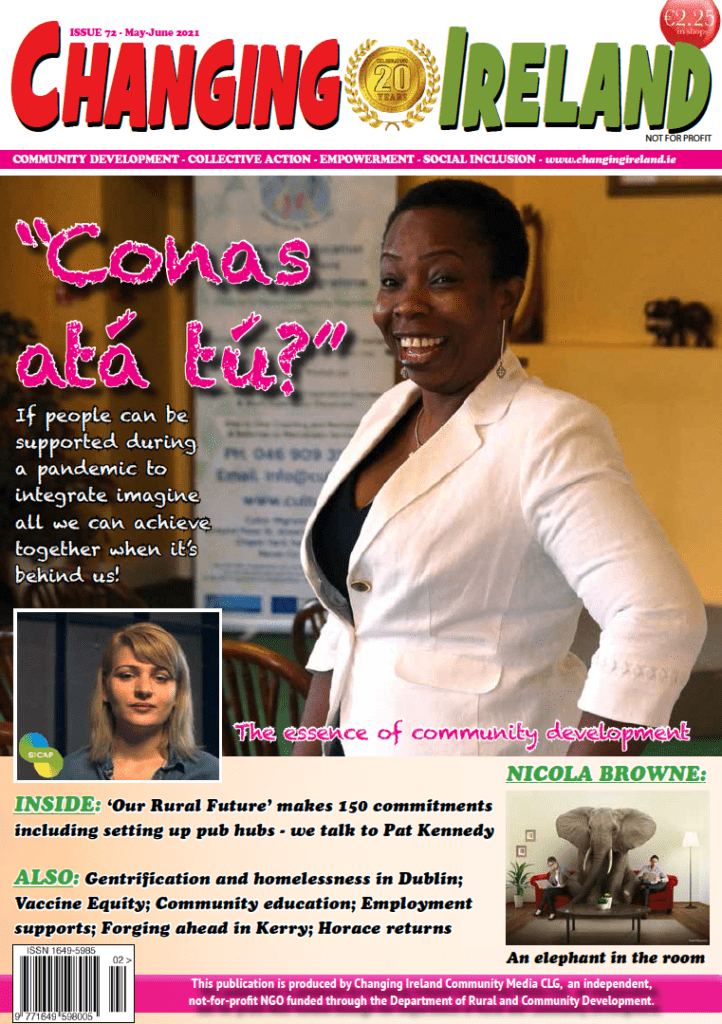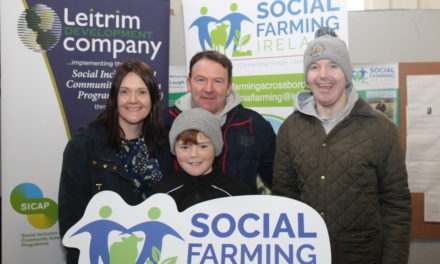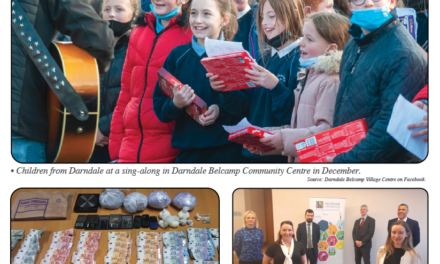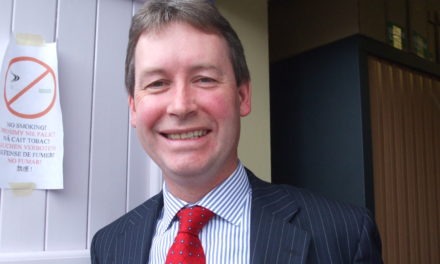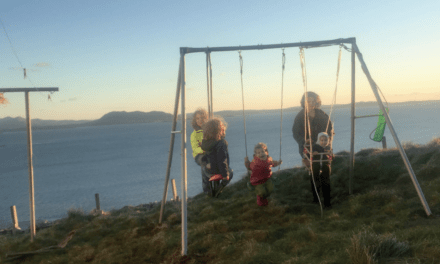In Wexford – as featured in our long read here – community workers under SICAP made people welcome during a pandemic. The same good community work is happening across the country, from Inchicore to West Mayo. It is but one of many #SicapStories. It would make for an ideal television series, as amateur film-makers are proving.
Long Read – INTRODUCTION
– By Allen Meagher, editor, ‘Changing Ireland’
The world of community development has become fertile ground for documentary film-making. The work in communities – previously hidden from view – is being showcased online nowadays through amateur video.
LEADER programme beneficiaries, members of The Wheel, and lately workers funded under the Social Inclusion and Community Activation Programme (SICAP) now all produce videos from time to time to reveal how their work changes society.
In Wexford – as featured in our long read here – community workers under SICAP made people welcome during a pandemic.
Migrants, refugees and asylum-seekers are but one of many groups targeted for support. The programme spend of approx €44m in 2021 goes to supporting the following people in particular:
- Disadvantaged Children and Families
- People living in Disadvantaged Communities
- Disadvantaged Young People (aged 15 – 24)
- People with Disabilities
- Disadvantaged Women
- Roma
- Travellers
- Lone Parents
- Those Disengaged from the Labour Market (Economically Inactive)
- Low Income Workers/ Households
- The Unemployed
- New Communities
- Emerging Needs Groups (chosen at local level).
Good community work under SICAP is happening across the country, from Inchicore to West Mayo and the Inishowen peninsula to Cape Clear and every town and city in between. It is carried out by Local Development Companies (all members of a network called the Irish Local Development Network – full list here).
The Minister responsible for Community Development – Minister of State Joe O’Brien – is especially familiar with integration work from his own past involvement in NGOs.
As he has himself highlighted, the Government of Ireland now reaches out through community workers to support asylum-seekers from the moment they arrive.
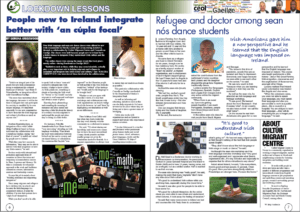 In Meath for example – as also reported in Issue 72 of ‘Changing Ireland’ – an independent organisation Cultúr is working to integrate asylum-seekers, refugees and migrants. During the lockdowns earlier this year, Cultúr organised Irish language and dance classes that went down a treat.
In Meath for example – as also reported in Issue 72 of ‘Changing Ireland’ – an independent organisation Cultúr is working to integrate asylum-seekers, refugees and migrants. During the lockdowns earlier this year, Cultúr organised Irish language and dance classes that went down a treat.
However, it is primarily work funded through the Social Inclusion and Community Activation Programme that is enabling community groups to make the difference. Earlier this year, Minister O’Brien launched a report detailing SICAP’s effectiveness with new communities (see below).
Our long read here is one of the many #SicapStories to be told. ‘Changing Ireland’ has published over a million-and-a-half words of community development news over the past 20 years and it would be rewarding to see projects we highlight now get professional television treatment. Some of these stories are particularly suitable for documentary filming.
Wexford film on integration tells of the joys of community development work
TV-friendly showcases deserve airing
By Allen Meagher
A video shot in Wexford with asylum seekers shows broadly how community development organisations typically engage with people. It captures the nitty-gritty of what community workers do in a way we haven’t seen before.
“It focuses on relationships, being flexible, believing in potential and building on the strengths we know that each person and each community possesses, whether or not they are labelled as ‘disadvantaged’ or ‘deprived’, to work towards a better future,” says Siobhán O’Brien, policy co-ordinator with Wexford Local Development (WLD).
The video is also topical because a report published in March showed how community organisations funded through SICAP were successful in promoting integration across the country. WLD’s work in Rosslare and Courtown shows in detail how they go about this critical work.
The video digs deep. Rarely, for instance, to you hear community workers speak of the joy they experience in the course of their work.
They generally tend not to be a self-congratulatory lot and to leave the talking to managers and to people they support.
However, more insights than ever are now being provided into community work in Ireland through videos such as this one.
The Wheel has for some years run a popular video competition. LEADER began doing the same last year. And for the past four years, the 49 organisations across the country engaged in anti-poverty work under the SICAP programme produce videos to showcase their work.
WLD’s video* captures the essence of community development work.
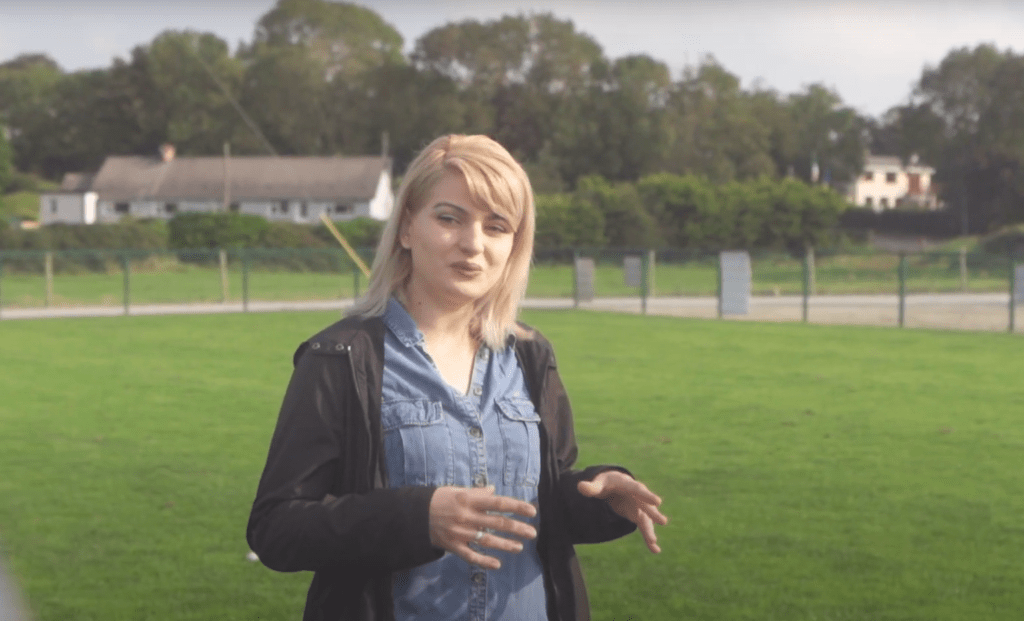
• Mariam Dudashvili – “We have many problems when we arrive here. We worked for a long time on a manifest and we presented it to many TDs and to the Minister for Justice.”
It works because while many stories tend to focus on outcomes for the beneficiaries/clients/people experiencing disadvantage, this story is told from a variety of viewpoints – the people who arrived here seeking sanctuary, the accommodation centre manager and all-importantly – the community development workers.
In 16 minutes, you get a strong sense of how community work works – the subjects talk about developments over two years involving over a hundred people and multiple communities.
It helps that the video is not laden down with the lingo community worker are often obliged to speak off-camera (target groups, disadvantaged individuals, IRIS, programme implements – few like these terms!)
Video-making is one of the newer challenges for community organisations. It’s not an easy task to capture what they do, and why, and how on film.
For example, the lighting in WLD’s video was at times a little dark. Other videos featured television-standard filming. Getting subjects to speak comfortably on camera is obviously an accomplishment. All new territory for community groups, but worthwhile given the need to showcase what groups do.
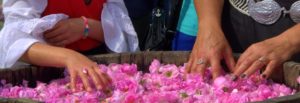
One is reminded of the challenge in producing rose oil; it takes 5,000 kilograms of rose petals to produce a single litre.
However, here’s one formula for distilling the work of community development to the point where it is easily explained: include the voices of community workers as well as those they strive to empower.
Another tip is to google #SICAPstorymap and take ideas from the 18 videos featured there (most if not all link to longer, more indepth films).
One day yet, a television production company may see the potential here for a series and focus their professional lens on community development work in Ireland today.
* Watch WLD’s ‘I Feel Home’: http://bit.ly/SICAPStoriesWx1
STORY BACKGROUND
Wexford Local Development’s SICAP team first engaged with people seeking international protection in May 2019 when asylum-seekers were accommodated in emergency Direct Provision Centres in Courtown (2) and in Rosslare Harbour.
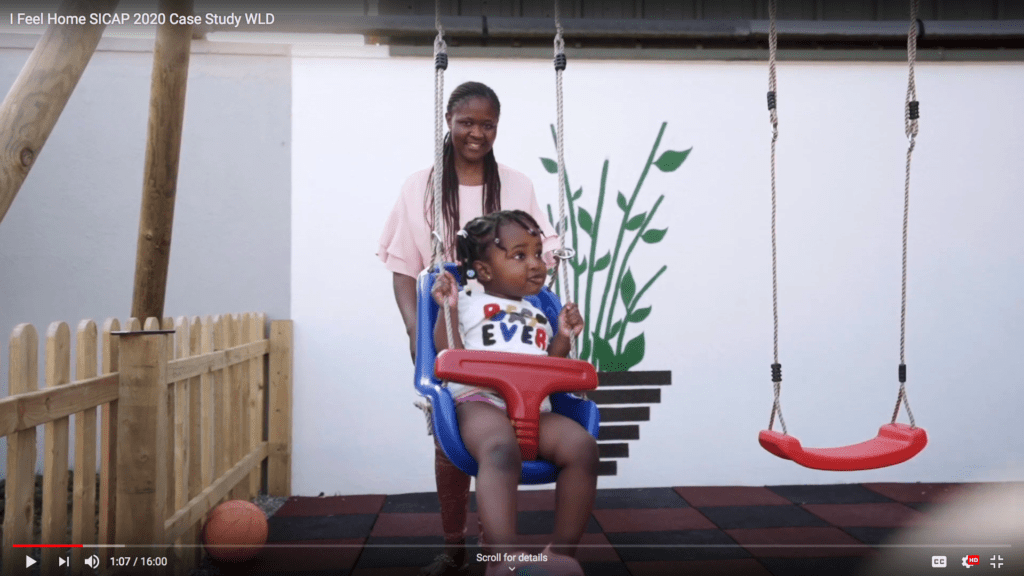
On March 16th, 2020, right at the beginning of the pandemic, a non-emergency accommodation centre opened in Rosslare Harbour replacing the emergency centre in the port. It caters for 114 with men, women and children from 29 countries. Courtown continues to have one emergency centre accommodating almost 50 people.
The video case-study from Wexford Local Development (WLD) tells the story of how its SICAP team engaged with these people.
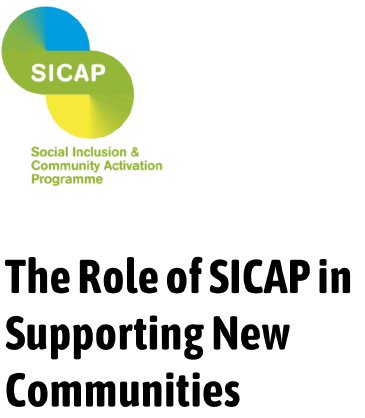
• Earlier this year, Minister Joe O’Brien launched a report detailing the programme’s effectiveness with new communities.
“It gives a sense of the quality and depth of the relationships which were developed and which now underpin a web of connections,” said policy worker Siobhán O’Brien. “In turn, this created the conditions for personal development, mutual support and learning, awareness, integration and even, despite what might be expected, some joy.”
The numbers indicate just how intense the work was. In 2020 alone, an average of 12 interventions were delivered under SICAP to each of the 84 people who engaged with the programme.
As Siobhán says, “If every intervention, contact, call, WhatsApp message was to be counted however, then this figure would be much higher.”
“While we fully understand the need to account for our work in numbers, at some point we have to prioritise building relationships and trust over counting transactions.
“The beauty of this web of connections is that we will never know for sure which of the interventions was the one which made the real difference to a person, but in creating this web we know that change is possible,” she said.
Real community work is about building trust, relations and community
– On the rationale behind focusing not on outcomes but on process
By Siobhán O’Brien
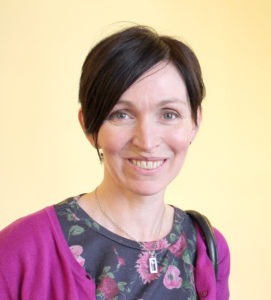
• Siobhan O’Brien
Siobhán O’Brien explains how their team went about producing a video to showcase some of Wexford Local Development’s work (under SICAP) with people seeking international protection.
* * * * *
In preparing this video, one of the SICAP team involved in working with people seeking international protection in Wexford pointed to a young man who has made ‘no progression whatsoever’ in terms of what we are used to recording on IRIS or even in a typical case study.
This man has had a difficult time since arriving in Ireland, struggling to learn English, to avail of training or to find employment, all the while under pressure from his family in his country of origin who are constantly in touch, waiting for news that he has found a job. He carries the weight of all that expectation and hope and it is a heavy burden.
Our community worker has slowly gained this man’s trust and has built a relationship with him, in the process discovering that he is struggling with his mental health and confidence. She has encouraged him to take part in some group work and he is beginning to smile and engage with his peers. So we asked the question – is this work any less valuable than that which ‘results in something’? A job, a certificate, a ‘happy ending’? This got us thinking about what story we really wanted to tell in our video.
So, this case study takes a different approach than usual by focusing on the process rather than the outcomes of work undertaken by SICAP. This came after many discussions within our team which concluded that in highlighting how many people take part in an initiative or what progressions have been achieved, a key and important aspect of the work often goes completely unseen.
That unseen aspect of our work is the extent to which the way we work under SICAP is driven and inspired – not by the number of transactions or interventions that occur in a ‘service’, but rather by creating and sustaining a web of human relationships and connections. They in turn create the conditions for individuals and communities to reach their potential and to avail of opportunities, to feel like they belong. This is what we mean by engagement.
This web starts by developing a non-judgemental relationship based on trust with the individual, whether that person is looking for help in their own life or for their community, and builds out into a network of supportive relationships. We have been emboldened in this approach by ground-breaking work in the UK around what are termed “deep value relationships”.
(You can download the report via: http://bit.ly/deepvaluereport).
The words that best sum up the outcome that we were aiming for are those spoken (in the video) by Robert and echoed by Mariam, Kais and Joy who said: “I feel home”.
How Wexford gained the trust to work with people here seeking sanctuary
By Siobhán O’Brien
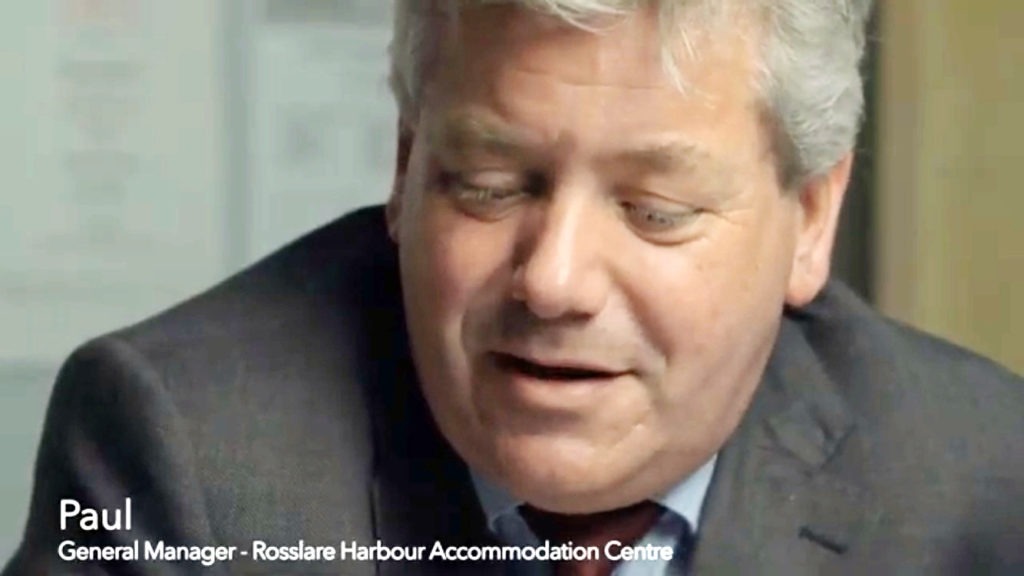 Wexford Local Development’s case-study and video highlights the different elements of “the relational approach we take in SICAP and how it has evolved in our work with people seeking international protection”. This edited description of Siobhán O’Brien’s report tells how the team planned their video production:
Wexford Local Development’s case-study and video highlights the different elements of “the relational approach we take in SICAP and how it has evolved in our work with people seeking international protection”. This edited description of Siobhán O’Brien’s report tells how the team planned their video production:
Introductions
Viewers see what happens during the initial engagement, those first encounters, and how we start to build the relationship.
One-to- One
The SICAP team begins with the person, gaining and developing trust, sharing a human experience, having conversations, entering a partnership with a view to journeying the road together.
Here, our team spoke about the challenges they encountered in this work.
We explained how SICAP acts as a catalyst for connection and collaboration by developing relationships with key stakeholders and partners. One of those who speaks is the manager of the centre in Rosslare.
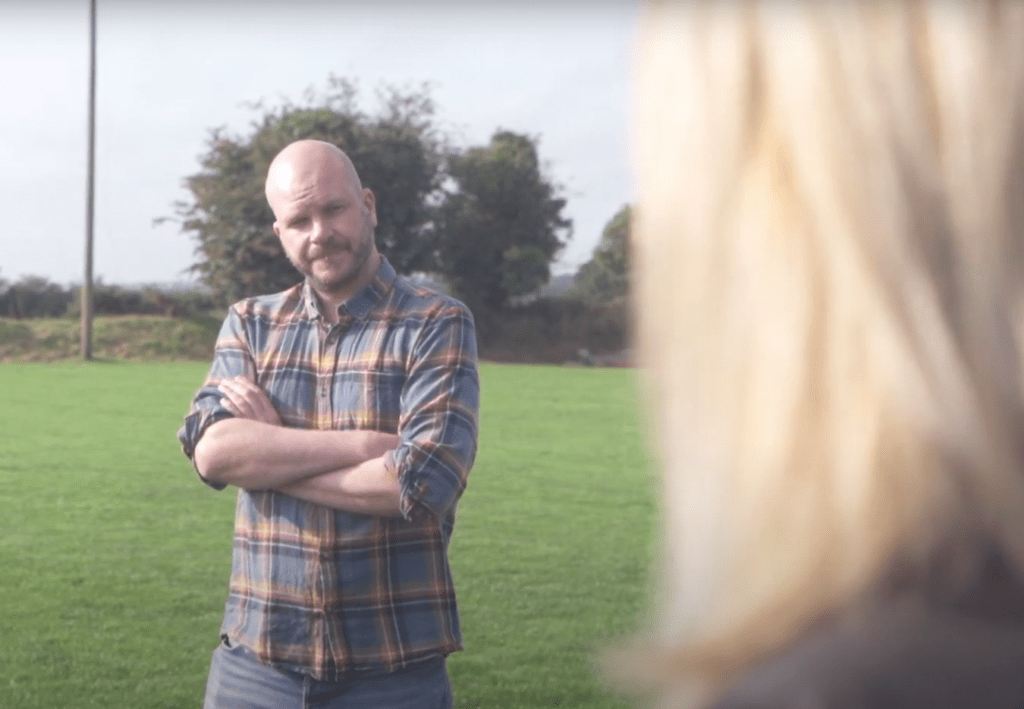
• Gorey-based community worker John Kelly.
Connecting with the Community
Achieving a sense of belonging and mutual discovery plays a big part in the links we forge between people living in accommodation centres and people in the local community.
People are people and languages are not all spoken. However, the languages of kindness, compassion, creativity, fun and community spirit are universal and spoken fluently in Courtown and Rosslare. This was not inevitable as we know from how events unfolded around Ireland. It took a lot of investment and careful planning and communication, facilitated and directly supported by SICAP staff to achieve that sense of belonging and acceptance.
Shaping the Future
The bigger picture, the wider web of connection and influence is always in our mind. This is what community development is all about – the web of connections that unite the individual person with those sharing the experience of seeking international protection and others volunteering in the local community and moves outwards to politicians and decision makers.
The success of Wexford’s Sanctuary Ambassadors is testament to the community development focus in SICAP. It supported the mobilisation and networking of local volunteers with elected representatives, enabling them to tell their stories and advocate for a more humane approach to policy development in the area of direct provision and the needs of individuals seeking international protection.
Relationships – the Essence of SICAP work
David Robinson says that “relationships are a contact sport”. You need to get close and build trust, do what you say you will do and be consistent. Relationships are what transform lives.
Relational poverty – disconnection from the networks of family, friends and contacts that more advantaged people take for granted – can be even more destructive than material poverty.
The antidote: To show up, be authentic, be flexible, believe in potential, hold a space for people, and create hope. This is a statement not only about how we want things to be for the people living in direct provision, but about the kind of society and world that we hope to contribute to, one based on equality, partnership, shared humanity and caring. A world where we are not ‘service providers’ and ‘service users’, but people, united in the shared goal of building stronger communities to which we belong together.
* * * * *
“I feel part of the community now” – Robert from Malawi
– Team felt “honour” of being community workers
By Allen Meagher
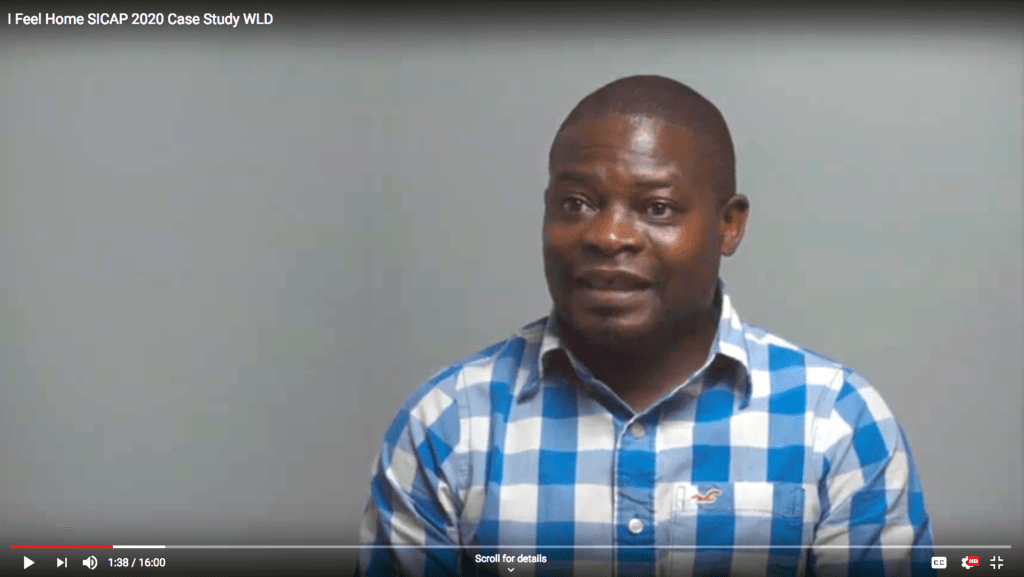
• Robert Lapken from Malawi, now living in Co. Wexford.
Reflecting on his time here to date, Robert Lapken from Malawi (now Rosslare) told film-makers:
“I feel part of the community right now. I see a lot of positive impact on my life. At first, I felt like I was lost. Now, I feel home.”
Joy Osas Igbinoba from Nigeria said, “The way people here embrace me, I never thought of it happening. I can say categorically that Irish people are really good and friendly. Seeing people who are ready to sacrifice for you has made me more confident about my future.”
This is the culmination of many months of work by the SICAP team from Wexford Local Development (WLD) with people new to Wexford seeking sanctuary and safety.
“What I’m always looking for is that they feel part of the community. You’re trying to create the kind of world where they feel welcome,” said Jenny Kirwan of WLD.
“They’ll always remember the way you made them feel,” she added, looking back. “And to feel as though we’re part of their lives at this really vulnerable stage, when life is tough, and that we can be part of a welcome, that we can make them feel better about themselves – that to me is where the value of this work really is.”
WORKING 1-to-1
Rosslare-based SICAP worker Jenny Kirwan said, “It was quite challenging. They had lost hope. It was very much ‘Let’s see where you are at’. They needed to trust me, to believe I could help them in some way.”
“I introduced myself as Jenny. I didn’t mention SICAP or Wexford Local Development at that point. It would confuse things. I explained what my role was, but didn’t go into detail. It was about engaging with the person and most importantly listening, rather than me doing all the talking.”
She organised a HACCP food safety training course just before the pandemic hit.
“It was like the day trip of the century for these lads. They were grinning from ear to ear. It had me thinking – something small to me was huge for them.”
“I kept the momentum going. The beauty of the relationship we develop is that the client takes the lead – we’re there in support. We ensure the person’s needs are being met in whatever way we can.”
Feeling at home
The WLD team found collaboration with other groups to be “hugely successful” – for example they organised a trip to a GAA club.
Residents recalled such trips.
“We met the local people, we all played football and it was a good feeling,” said Kais Khachi. “It changed our feeling because when saw people smiling, we – all of us – felt welcome to be in the community.”
Jim Higgins, chairperson of Tara Rocks GAA Club, said, “We were the better for it.”
Empathy at work
Through various collaborations, the community development work progressed – the residents developed a manifesto about asylum-seekers problems and presented it to national politicians.
“We want to show people our skills, what we can do,” said Robert.
The team noted the progress.
As Gorey community development worker John Kelly, said:
“To be honest, it’s a privilege to do this work. It’s an honour to do this work and not every body gets the opportunity to do it.
“When I go to work everyday and look at the people living in the centres, you can’t help but think – that could be me or that could be my family. How would I like us to be treated if we were in the same situation? That’s one of the basic things it comes back to.
“The work is complex. 99% of the time you can’t fix their problems. What we try to do is look at what we can control – we can control how we are with somebody, the things we say and the things we do. If we do that, we’ve done something good.”
He said, “If somebody feels they can contact me afterwards and they know I’ll give them the time and respect they deserve and be honest and try and get some kind of positive outcome for them, I think that’s a measure of success.”
“I see people smiling every day and I smile, because I know this is their home, that they feel comfortable here,” he said.
* * * * *
WHAT IS S.I.C.A.P.?
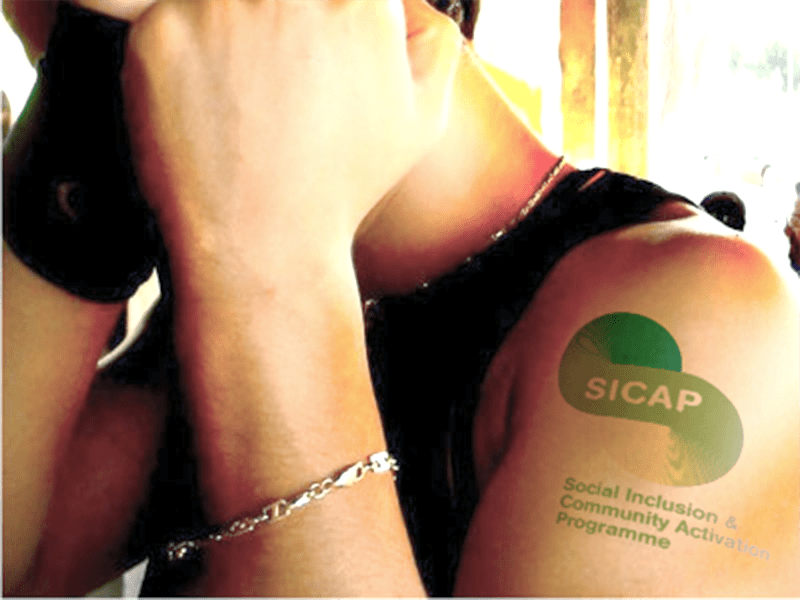
• SICAP is of critical importance to individuals, communities and the country as a whole. Initially, the programme was not so well known, having replaced the Local Community Development Programme and before that the Community Development Programme and LDSIP. As new acronyms come and go, it takes time for people to distinguish those of importance from those of lesser importance. And humour is an absolute necessity for anyone working successfully in community development. Graphic by Changing Ireland.
SICAP stands for Social Inclusion and Community Activation Programme.
It is the Government’s primary social inclusion intervention. It seeks to reduce poverty and to promote social inclusion and equality through supporting communities and individuals using a community development approach. It provides support to the most disadvantaged and the hardest to reach in communities.
The programme is funded by the Department of Rural and Community Development and co-funded by the European Social Fund. The Department has engaged Pobal to work on its behalf to manage and oversee the delivery of SICAP nationally. At local authority level, the programme is managed by the Local Community Development Committees, while the programme actions are delivered by the aforementioned Local Development Companies.
SICAP has a budget from 2018-2022 of €190m.
* * * * *
11 Actions Supporting Newcomers to County Wexford
Under SICAP Goal 1, support is provided to “communities and target groups to engage with relevant stakeholders in identifying and addressing social exclusion and equality issues, developing the capacity of local community groups and creating more sustainable communities”.
The following are among the initiatives taken by community workers in Wexford through SICAP support for new communities, including refugees and asylum seekers.
- Support for five local community groups whose specific target group is people seeking international protection in Co Wexford.
- Collaboration with Food Cloud, Tesco and WLD’s wider programme teams to bring weekly fresh food drops to Rosslare Accommodation Centre.
- Provision of multiple opportunities for people to volunteer with local community groups such as Tidy Towns, Men’s Sheds, arts groups and women’s groups.
- Development of collaborative projects to increase community integration. Linked, for example, with Wexford Bicycle Users Group to provide bike maintenance, cycle safety programmes and sourced bicycles from private sources.
- Supporting young people to participate in local educational services and opportunities including pre-school, mainstream education and youth services.
- Promoting participation in sporting activities. This includes the formation of the Wexford Sanctuary Runners. (Follow them on Twitter: @RunnersWexford)
- Creation of links with organisations such as Barnardos, the Education and Training Board, Places of Sanctuary Ireland, Wexford County Council, Irish Refugee Council, Tusla and Wexford Lions Club to meet needs that are beyond the remit of SICAP.
- Leverage of supports from Wexford County Council Arts Officer for delivery of arts and cultural activities that involve the wider community.
- Supported the setting up of Wexford Sanctuary Ambassadors, including a training programme to enable asylum-seekers, refugees and migrants in Wexford to influence policy and decision making. The group learned from Pat Montague how to tell the stories of the real experiences of living in Direct Provision.
- Linked with community groups to provide equipment for mask-making and other community health projects.
- Provision of back to school packs to all children living in the centres.
* * * * *
Integration supports for individuals in Wexford
Under SICAP Goal 2, support is provided to individuals experiencing disadvantage “to improve the quality of their lives through the provision of lifelong learning and labour market supports”.
The following are a sample of the actions to support individuals taken by community workers in Wexford.
- On-going trauma-informed emotional support for those struggling with anxiety related to the Covid-19 crisis.
- Advocacy support and information regarding the cancellation of all International Protection Appeals Tribunal hearings.
- Advocacy work for children who moved into the centres resulting in the donation of clothes, toys and educational resources.
- Provision of harm reduction information to minimise risks of transmitting Covid-19, in so far as is possible while living in Direct Provision.
- Provided information from the Irish Refugee Council in relation to securing access to a GP during the pandemic.
- Referral to free online training resources and support in accessing them.
- Provision of laptops to facilitate online study. Rosslare clients are regularly making use of them for Driver Theory Practice and online communication.
- Referral to SICAP funded online accredited training to support work readiness.
- Technical support with online remote learning.
- ‘Integration Through English’ programme for those whose language skills are not as advanced taking in cultural awareness and confidence building.
- Support around the development of career and life goals.
- Skills analysis and career guidance.
- Provision of CV advice, information and support with job applications for those ready to apply for frontline work.
- Provided details for care sector workplaces for those seeking employment as healthcare assistants).
- Tailored job skills programmes with interview skills.
- Tailored introduction to Irish healthcare.
- Support with comparing foreign qualifications to their Irish equivalent. An Irish qualifications database has details of almost 1200 qualifications from over 140 countries.
DOWNLOAD & READ THE FULL MAGAZINE (PDF): Spring 2021 Edition

